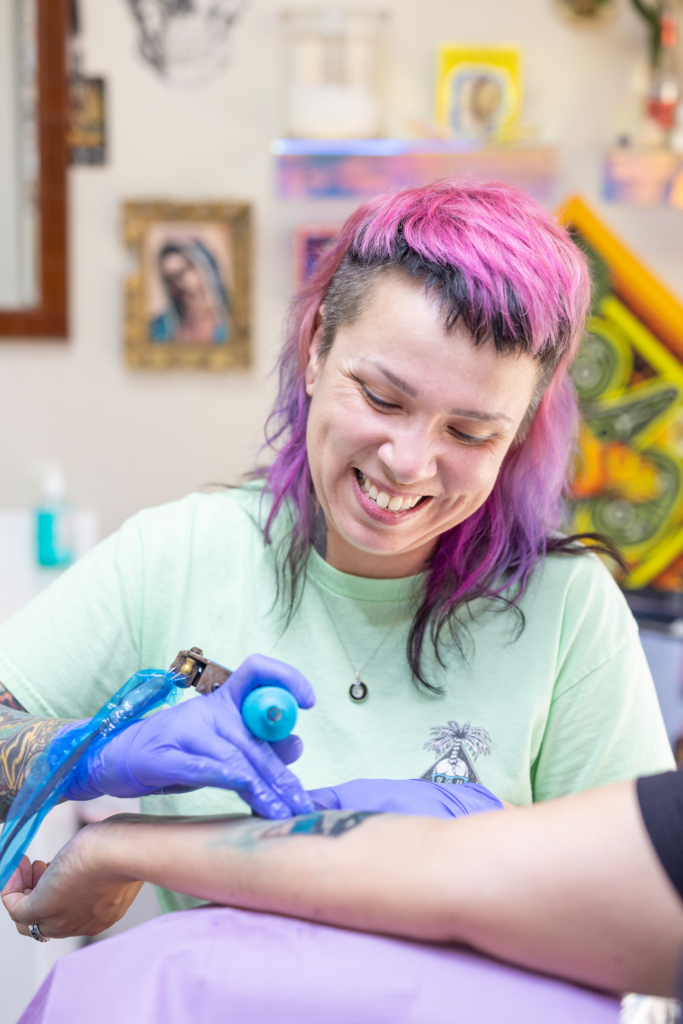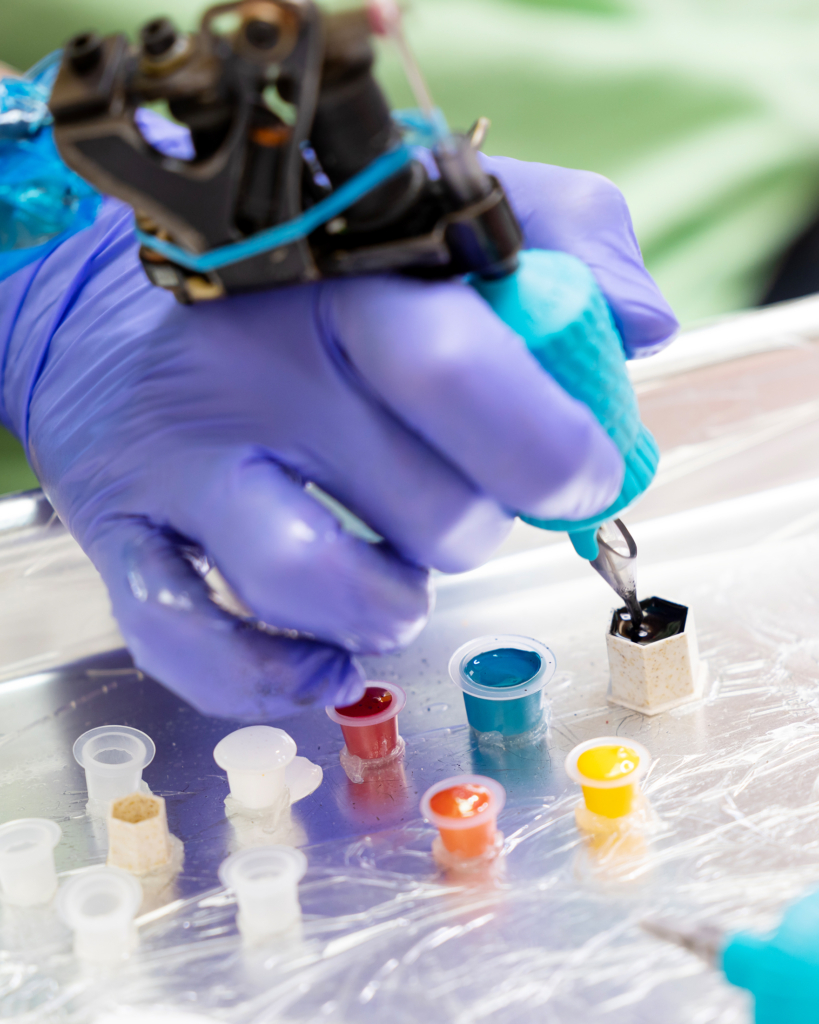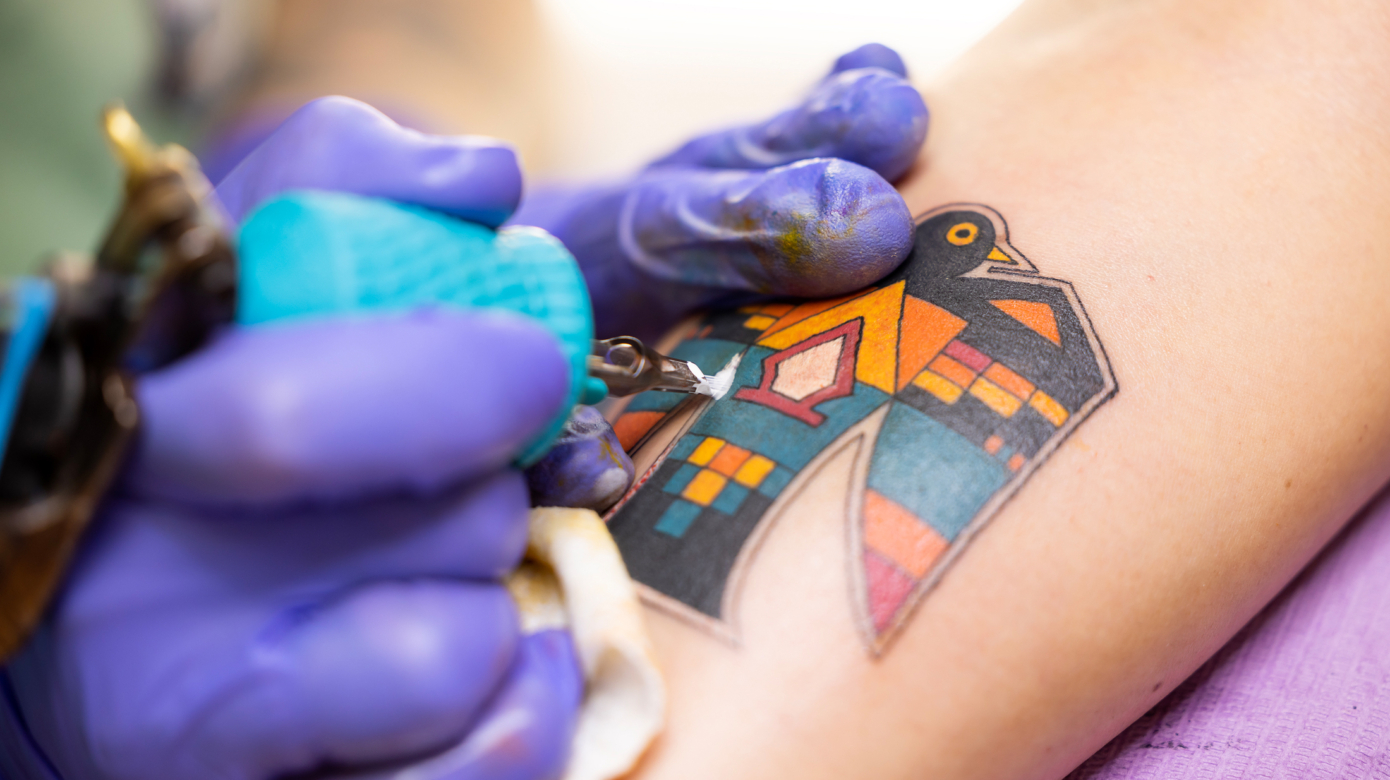Indigenous cultures across the globe have used tattoos as status symbols, to represent religious beliefs or just for adornment, according to the Smithsonian Magazine. The word “tattoo” is believed to have come from the Polynesian word, tattau, meaning to hit or strike.
In North America, Indigenous cultures are no different. Whether a tattoo symbolizes coming of age, indicates position within a tribe, or offers protection from spiritual or physical threats, many tribal nations practiced tattooing. Today, more Indigenous people are reclaiming the practice that was once discouraged by society.
One Potawatomi artist proud to share her spin on Indigenous tattoo art is Shelly Wahweotten, an enrolled citizen of the Prairie Band Potawatomi Nation and owner of Analog Electric Tattoos in Oklahoma City.
Originally from Wichita, Kansas, Wahweotten grew up along the powwow trail with her parents and siblings. She has always been an artist, spending hours drawing with her father. His tattoo magazines inspired her.

“He would buy tattoo magazines, and I would steal all of them and redraw all the tattoos inside of them. Little did I know that that’s one of the main practices that we do every day is redrawing, coloring and making flash sheets that you can sell tattoos off of. I was doing that in fifth grade. I think that’s when I decided I’m going to probably be a tattoo artist,” she said.
While her father supported her decision, her mother initially was hesitant. But Wahweotten persisted.
“I kept drawing, and I eventually got a tattoo kit out of the back of a tattoo magazine. My dad had ordered it and I got it for my 15th birthday, and I was so scared to use it. My dad said, ‘We’ll just see if you can do anything with this.’ I tattooed my boyfriend at the time with these old English letters, and he still has it. That was definitely the groundbreaking moment of becoming a tattooer,” she said.
Wahweotten said for a while, her mother wondered whether tattooing was a viable career path.
“She wanted me to do things that would have had a more secure pathway, like join the military, go to college, work in a local aircraft company,” Wahweotten said.
At the time she entered the industry, tattoos had negative connotations.
“It was (associated with) drug addicts, bikers, gang bangers, people that couldn’t stay out of jail. I think there’s a generational view that you don’t decorate your bodies, you don’t desecrate temples. But as an Indigenous person, that gets debunked with different rites and passages. So, I just stuck with it,” she said.
Her mother fully embraced the unique career choice after learning it was an art form, a worldwide trade and a good career. Wahweotten said her mother is now one of her biggest champions and is proud of the art her daughter creates.
“I had opportunities to go everywhere and anywhere, and after she learned more about it, she is so incredibly supportive of me now,” Wahweotten said.
Acceptance of tattoos
Wahweotten believes the old stereotypes are fading away. Younger generations largely view tattooing as an artform that stands on its own, she said. Public representation is increasing as well.
Oglala Lakota model Quannah Chasinghorse, Native Hawaiian-Pawnee actor Jason Momoa and Shoshone-Bannock tattoo artist Kira Murillo are among the pop culture figures who have emerged as high-profile advocates for the practice. Chasinghorse has traditional facial tattoos, Momoa has a forearm tattoo tribute to his aumakua, or family god, and Murillo is known for her colorful, modern interpretations on traditional floral designs.
“I think (reclaiming tattooing) comes down to it being a cultural aspect for Native American people or Indigenous people all around the world. Colonization, forced religion and different periods of time created a lot of stigma about tattoos. Thankfully now, people are opening their minds and understanding a lot more,” Wahweotten said.
“I feel like I’m in the right place at the right time doing the right things that I have always should have been doing because I have something to represent for my people, for my culture, because it is part of us.”

Industry voice
The decision to open her own shop was not taken lightly. While more women are entering the industry, they still face challenges on the job. Women are sometimes told they “bring drama” to a shop, or they feel management does not value their artistic viewpoint, she said.
Shop management may have preconceived ideas of what an Indigenous tattoo should look like, Wahweotten said.
“I’ve worked at a shop a couple of years ago that had great opportunities for growth. But I felt whitewashed into what they wanted to represent,” she said. “Having my own shop here was to be able to represent myself and be able to do Indigenous tattoos and represent all of us in our unique and correct ways. Not in appropriated ways.”
Wahweotten is serious about translating an idea into art. With her understanding of various tribal traditions and Indigenous culture, she is uniquely positioned to create a lasting piece of art.
“The tattoos that I do, no matter what they are, they identify that person. You can tell not necessarily a lot about that person from their tattoos, but it definitely points you in more in a direction of who they are and what they want to represent and what they want to say with those tattoos,” she said.
A permanent part of a life
Wahweotten recognizes her art as a permanent part of the lives of countless people and serves important purposes.
“Somebody told me recently that their tattoo gave them different confidence and changed their life. (One client) had some pretty extensive scars all the way around her waist from surgery. We covered them up with flowers. When she got married, she was able to wear the dress that she wanted to wear and felt confident and felt good. That was one of the things that makes me feel incredibly humbled and thankful for what I can do for other people,” she said.
“It’s a little overwhelming, thinking that I’ve tattooed somebody 20 years ago, and now their children are completely grown and getting their own tattoos. Now I’m seeing (young people) that I probably will see in 15 more years coming in and getting their tattoos, which I think is amazing. Now I’m already at two (generations), which is pretty cool.”
Connecting with her heritage
Wahweotten jumps at the chance to connect with both her father’s Potawatomi side and her Chickasaw relatives on her mother’s side. Now that she is based in Oklahoma, she frequently visits Potawatomi and Chickasaw lands.
“I’m learning more and more. Being here has definitely opened my eyes to some of the things that I missed out on,” she said.
Her schedule is filling up fast. She hopes to attend the annual Prairie Band Potawatomi Powwow as well as the 2023 Potawatomi Gathering in Fulton, Michigan. It will be hosted by the Nottawaseppi Huron Band of Potawatomi of Pine Creek. However, running a business means she often works all weekend. This year, she is scheduled to work during two tattoo conventions in Tulsa and Oklahoma City.
“Later on in the year, I’ll probably go to Tampa (Florida) for another convention. Being established here in Oklahoma City as a new tattoo shop and being female owned and Indigenous owned, I want to make sure that I get the word out around Oklahoma. So, I’m pretty excited about having the opportunities to get out again,” she said.
Wahweotten also plans to gauge future interest in having an Indigenous tattoo seminar to educate people about the importance of traditional Indigenous tattoos and help people design and get a traditional tattoo.
In her free time, she and her dachshund, Diamond, the Analog Electric Tattoos shop dog, explore the Oklahoma City area together.
For more information about Wahweotten’s work, visit Analog Electric Tattoo or connect with her on Facebook. Contact the shop at 405-849-9247 or by email at Elbowaho@analogelectrictattoo.com.

